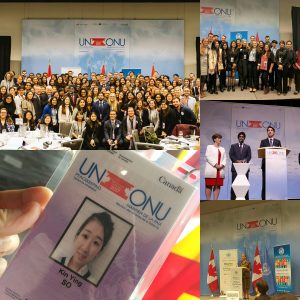 Last week, I had the privilege of attending the 2017 UN Peace Conference in Vancouver. This experience has left me with a lot to think about around youth, gender parity and peace.
Last week, I had the privilege of attending the 2017 UN Peace Conference in Vancouver. This experience has left me with a lot to think about around youth, gender parity and peace.
As a youth delegate at the UN Peace Conference, I was invited to participate in a “Youth as Peacemaker Forum”, where I had the opportunity to work amongst Canadian youth to present a list of priorities to the Prime Minister, Minister Sajjan of National Defense, and Minister Bibeau of International Development.
During the Forum, the infamous Resolution 2250 echoes in the speeches of Ministers and Generals. Recognizing that today’s generation of youth is the largest in the world has ever known, UNSCR 2250 addresses the demographic imperative of including youth on issues of peace and security and change the narrative from victims to heroes of their own stories. It is the first resolution that addresses specifically the role of young people in issues of peace and security, particularly in conflict and post-conflict settings. For the first time, resolution 2250 gives voices to groups traditionally excluded from the security dialogue: women and youth.
In the conversation about Resolution 2250, a quote from Major Rachel Grimes’s speech, a UN Military Officer,and Adviser, has stood out to me:
“All male force and all male patrol will not have the same impact as a mixed patrol. To better support the UN peacebuiling goals, a better understanding about gender dynamic is important to build a foundation for peace.” -LCol Rachel Grimes
Again, the gender perspective is prevalent in the conversation about peacekeeping – a traditionally male-dominated area. In particular, the Prime Minister has committed to extending the nation’s feminist approach to bolster peacekeeping and security. This, too, was an important priority recognized by the youth delegates and highlighted throughout our list of 16 policy recommendations to the government.
In addition to being actively involved as a youth and continuing to think about the intersection of feminism and policy issues, the conference has also sparked a series of reflections of what “peace” means in Canada. Peace is a big word that gets a fair share of usages. And in its iterations and reiterations, the word has perhaps not so much lost its meaning as it has gained too much meaning. Canada, for example, is a peaceful country in that it is not in an active war. Yet, a different set of peace and security issues manifests such as around indigenous rights, environmental policies, and the housing unaffordability.
What, what does peace mean to me then?
This is a working response, but for me, peace is about ensuring the basic human rights to live. It is about removing the barriers that would prevent the attainment of these rights. It is about the opportunity to be the person you want to be. This is #Mypeace.